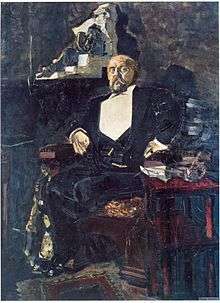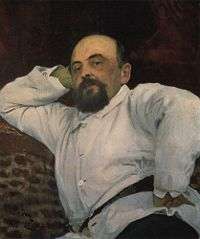Savva Mamontov


Savva Ivanovich Mamontov (Russian: Са́вва Ива́нович Ма́монтов, IPA: [ˈsavə ɪˈvanəvʲɪtɕ ˈmaməntəf]; 15 October [O.S. 3 October] 1841, Yalutorovsk – 6 April 1918, Moscow) was a famous Russian industrialist, merchant, entrepreneur, and patron of the arts.
Biography
He was a son of the wealthy merchant and industrialist Ivan Feodorovich Mamontov and Maria Tikhonovna (Lakhitina). In 1841 the family moved to Moscow. From 1852 he studied in St. Petersburg, and later in the Moscow University.
In 1864 Savva visited Italy, where he began to take lessons in singing. There he was introduced to the daughter of Moscow merchant Grigory Sapozhnikov, 17-year-old Elizabeth, who subsequently became his wife. The wedding took place in 1865 at Kireevo estate, near Khimki, just northwest of Moscow.
In 1869 he became a director of the Moscow-Yaroslavl railway. It was he who supervised the construction of the Severnaya Railway linking Moscow with the Russian North. He was also involved into the building of Donetsk railway from 1876 to 1882.
In 1870, Mamontov purchased the Abramtsevo Estate, located north of Moscow, and founded there an artistic union which included most of the best Russian artists of the beginning of 20th century, such as Konstantin Korovin, Rafail Levitsky, Mikhail Nesterov, Ilya Repin, Vasily Polenov, Valentin Serov, Mikhail Vrubel, the brothers Vasnetsov, sculptors Viktor Hartmann and Mark Antokolsky, as well as various others. The colony of artists who hosted there during the 1870s and 1880s sought to recapture the quality and spirit of medieval Russian art. Several workshops were set up there to produce handmade furniture, ceramic tiles, and silks imbued with traditional Russian imagery and themes.
Mamontov also patronized the Russian Private Opera which discovered the great Russian bass Chaliapin, and supported the Russian opera composers Pyotr Tchaikovsky, Nikolai Rimsky-Korsakov, Alexander Borodin, Modest Musorgsky, and many others. Drama and opera on Russian folklore themes (e.g., Rimsky-Korsakov's The Snow Maiden) were produced in Abramtsevo by the likes of Konstantin Stanislavsky, with sets contributed by the brothers Vasnetsov, Mikhail Vrubel, and other distinguished artists. "The Russian Private Opera" was Mamontov's main contribution to the arts. Mamontov acted as a stage director, a conductor and a teacher of singing.
The success of the "Private Opera" in the province was followed by a triumph in Moscow. However, everything ended in a collapse. In 1899-1900 Mamontov was unjustly accused of embezzlement with building of the Yaroslavl railway, arrested and put on trial.
Bibliography
- Arenzon, E. Savva Mamontov. Moskva, "Russkaia kniga", ©1995. ISBN 5-268-01445-5 (in Russian)
- Bakhrevskii, V. A: Savva Mamontov. Moscow, Molodaia Gvardiia, 2000, 513 p. [15 ill.] ISBN 5-235-02403-6 (in Russian)
- Haldey, Olga (2010). Mamontov's Private Opera : the search for modernism in Russian theater . Bloomington: Indiana University Press. ISBN 978-0-253-35468-6.
Quotations

- "I was a rich man, that's true, but I gave up everything since I believed that money is for the people and not people for the money. Who needs money when there is no life?" (Savva Mamontov: from his Diary)
- "Contemporaries called Savva Mamontov "Savva the Magnificent" likening him to Duke Lorenzo de' Medici who was known as Lorenzo the Magnificent. But Savva Mamontov was more than a patron of arts and letters, he was a businessman as well, and his contribution to both the national economy and the arts was equally great." (The Russian Cultural Navigator)
Popular Culture and Media
Third Eye Blind's song "Monotov's Private Opera" from the album Ursa Major is inspired by Mamontov's private opera.
See also
External links
| Wikimedia Commons has media related to Savva Mamontov. |
- The Russian Cultural Navigator: THE MOSCOW MEDICI (about Savva Mamontov)
- The Russian Cultural Navigator: SAVVA MAMONTOV
- Mamontov Savva Ivanovich, Russian entrepreneur and patron of art
- Mamontov typeface was named after Savva Ivanovich and has been inspired by Russian poster types of the beginning of 20th century.